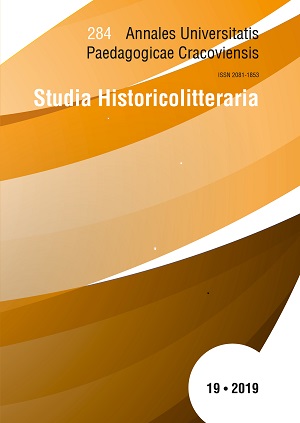Jerzy Ronard Bujański – powojenne pół sezonu w Starym Teatrze
Hauptsächlicher Artikelinhalt
Abstract
Jerzy Ronard Bujański was the first director of the Old Theatre after the Second World War (from the end of January to August 1945). The article presents turbulent beginnings of this management (the war was still in progress). Besides, the first premiere of the Old Theatre - Mąż doskonały by Jerzy Zawieyski - directed by Bujański, stage design by Andrzej Pronaszko. This performance referred to the character of Job from the Old Testament and was related to the Warsaw Uprising context. This show was one of the most important artistic events of the first season after the war. Next to the Old Theatre, Bujański established the Studio, which educated about one hundred people. The teachers included: Juliusz Osterwa and Tadeusz Kantor, while the students were, for example Tadeusz Łomnicki, Halina Mikołajska, Andrzej Hiolski, Kazimierz Mikulski and Jerzy Nowosielski. In August 1945, Jerzy Ronard Bujański was dismissed as a result of a conflict with the city authorities. However, during the time of his management, the theatre gained a high artistic position.
Downloads
Artikel-Details

Dieses Werk steht unter der Lizenz Creative Commons Namensnennung - Nicht-kommerziell - Keine Bearbeitungen 4.0 International.
URHEBERRECHTE
Der Herausgeber der „AnnalesUniversitatisPaedagogicaeCracoviensis. StudiaHistoricolitteraria” ist zur Nutzung und Verbreitung aller in der Zeitschriftveröffentlichten Materialien auf Grundlage eines nicht ausschließlichen, zeitlich unbeschränkten Lizenzvertrags befugt, der im Voraus unbefristet mit jedem/r Autor/in des jeweiligen Werks für die im betreffenden Vertrag vereinbarten Nutzungsbereiche abgeschlossen wird.
POLITIK DES OFFENEN ZUGRIFFS
Die „AnnalesUniversitatisPaedagogicaeCracoviensis. StudiaHistoricolitteraria” sind eine Fachzeitschrift mit freiem Zugriff, dessen voller Inhalt kostenlos für Nutzer und Einrichtungen auf Grundlage einer nicht ausschließlichenCreativeCommons-Lizenz (CC BY-NC-ND 4.0) verfügbar ist. Die Nutzer/innen können die Artikel in dieser Zeitschriftohne vorherige Zustimmung des Herausgebers oder des/r Autors/in lesen, herunterladen, Kopien anfertigen, verbreiten, drucken oder zu Volltexten verlinken, insofern die Quelle des Zugriffs und der/die Autor/inder jeweiligen Publikation angegeben wird. Dies ist mit der BOAI-Definition des offenen Zugriffs konform (http://www.soros.org/openaccess).
Literaturhinweise
Bujański J.R., Chwila osobliwa (Przed podniesieniem kurtyny), „Front Teatralny” 1945, nr 1, s. 2–4.
Bujański J.R., Starego Teatru druga młodość, Kraków 1985.
Fik M., Kultura polska po Jałcie. Kronika lat 1944–1981, London 1989, s. 49.
Głosy prasy, „Front Teatralny” 1945, nr 3, s. 35–36; nr 4, s. 26–27.
Kałużyński Z., Problemy powojennego teatru w Polsce, „Twórczość” 1947, nr 10, s. 27–60.
Kruczkowski L., Mesjanizm odgrzewany, „Odrodzenie” 1945, nr 20, s. 2.
Księga Hioba, przeł. z hebrajskiego C. Miłosz, Kraków 1998.
Kudliński T., Człowiek nowy – z bólu zrodzony, „Tygodnik Powszechny” 1945, nr 3.
Misiorny M., Teatry dramatyczne Ziem Zachodnich 1945–1960, Poznań 1963.
Mrozińska S., Karabin i maska, Łódź 1964.
Orzechowski E., Stary Teatr i Studio, Kraków 1974.
Pronaszko A., Zapiski scenografa. Wspomnienia, artykuły, listy, oprac. J. Timoszewicz, Warszawa 1976.
Słownik biograficzny teatru polskiego, t. 3: 1910–2000, vol. 1: A–Ł, Warszawa 2017, s. 125–127.
Wyka K., Pozycja Krakowa, „Twórczość” 1945, nr 2.
Zawieyski J., Wyznanie autora (Przed premierą „Męża doskonałego”), „Front Teatralny” 1945, nr 1, s. 5–8.
